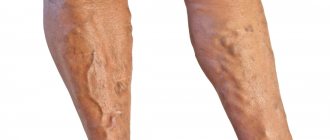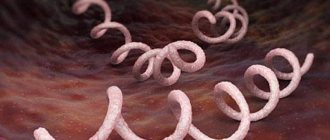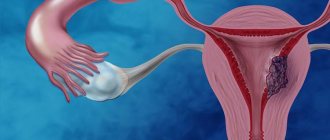Symptoms of hemorrhoids during pregnancy are not considered uncommon. Most often they manifest themselves in the form of burning, pain and irritation in the location of the anus, and sometimes bleeding during bowel movements. Particular discomfort is caused by inflammation in the hemorrhoids, which prevents sitting, walking, and sometimes causes sleep disturbances. Gradually appearing over time, as pregnancy progresses, the symptoms of hemorrhoids in women become more obvious and aggravating.
Why is there a problem?
Hemorrhoids in pregnant women develop under the influence of several provoking factors. A problem arises due to the overflow of veins and vessels with blood due to an increase in the load on the pelvic organs. This is due to the growth of the uterus. In addition, the causes of hemorrhoids during pregnancy may be as follows:
- development of constipation due to changes in the functioning of the digestive tract;
- pressure of the fetal head on the rectal area in the late stages of pregnancy;
- decreased motor activity of the patient;
- regular use of contraceptives before pregnancy. These drugs negatively affect the condition of blood vessels;
- weight gain;
- poor nutrition;
- genetic predisposition;
- changes in a woman's hormonal levels. An increase in progesterone causes a decrease in the tone of the smooth muscles of internal organs, including the rectum.
Due to the factors described above, hemorrhoids form during pregnancy. Treatment of the pathology must be timely, because the symptoms of the disease significantly reduce the quality of life of a woman during pregnancy.
How to treat
The appearance of a disease during pregnancy such as hemorrhoids cannot be ignored. It must be treated and not hope that the disease will go away on its own. The processes occurring in the body due to ongoing changes are accompanied by constipation, gastrointestinal dysfunction, and various inflammations. Disturbances in the functioning of the intestine and its untimely emptying contribute to the accumulation of toxins in the blood, which will definitely affect the health of the pregnant woman in a negative way.
The problem with timely treatment lies in the hidden nature of the onset of the disease. In half of women, hemorrhoids are discovered only during childbirth, when the passage of the fetus puts pressure on the pelvic organs, releasing dilated veins.
As one of the treatment methods, the expectant mother needs to normalize her intestinal function by making changes to her diet. A pregnant woman's menu should be dominated by products of plant origin, fermented milk and rich in fiber, as well as a variety of fresh vegetables and fruits. Therapeutic gymnastics is considered to be a fairly effective method for eliminating and preventing hemorrhoids.
Exercises lying down with elevation of the pelvis are useful, and it is also necessary to limit exercises in a standing or sitting position. If there are complications, the doctor prescribes external medications approved for use by pregnant and nursing mothers. The use of such products can reduce or completely eliminate the symptoms of hemorrhoids, and also softens the contents of the intestines, which makes cleansing it painless and non-traumatic to the mucous membrane.
How does the disease manifest itself?
Signs of hemorrhoids during pregnancy are quite difficult to ignore. Often the symptoms of pathology have a certain chronology. The initial stage can occur latently, without visible manifestations. At later stages, the following signs of the disease develop:
- discomfort in the anus, accompanied by a feeling of a foreign object in the anus, itching, burning after bowel movement;
- bleeding is a common sign of pathology. In this case, the blood has a scarlet color and is localized on top of the feces, without mixing with them. The intensity of bleeding varies, from a few drops to significant bleeding. More often this symptom is observed in the presence of anal fissures;
- pain syndrome can be either temporary or permanent. Typically, pain manifests itself during the act of defecation and persists for some time after its completion.
Symptoms of hemorrhoids negatively affect the physical and emotional health of the mother, causing depression and a general decrease in quality of life.
Symptoms of hemorrhoids are wave-like. Periods of remission are often followed by exacerbation.
Important! If you notice symptoms of the disease during pregnancy, you should consult a doctor as soon as possible. Therapy in the early stages of pathology will help cope with the disease and prevent complications.
The main symptoms of hemorrhoids in pregnant women
The disease occurs unexpectedly, when, it would seem, nothing foreshadows the appearance of such changes in the body. Gradually, the symptoms of hemorrhoids increase, which is manifested by frequent constipation, unpleasant sensations in the location of the anus, severe itching, sometimes turning into a slight burning sensation. These symptoms can intensify with stress, with non-compliance with the diet, with fast walking, or while going to the toilet.
After defecation, the feeling of incomplete bowel emptying persists, which is one of the characteristic signs of the development of hemorrhoids. During pregnancy, a woman's blood circulation in the pelvic organs is impaired due to the pressure of the growing fetus. For this reason, increased pressure in the vessels causes them to expand and form nodes. The first important symptom of hemorrhoids is bleeding, which can result in prolapse of hemorrhoids. At first they are small in size and can be pushed into place without much effort.
As the disease progresses, the changes are so significant that reduction becomes impossible. As a result of developing pathological processes, thrombosis or necrotic changes in the nodes can form, which is a serious threat to the health of a pregnant woman.
Types of pathology
In medical practice, a distinction is made between primary and secondary hemorrhoids. The primary type of disease develops under the influence of various reasons, such as constipation, sedentary lifestyle, pregnancy, childbirth, etc. Hemorrhoids in pregnant women belong specifically to this group. The secondary form is a consequence of cirrhosis of the liver, serious cardiovascular pathologies, vascular diseases in the pelvic area, cancer, and other things.
Depending on the location, the internal and external appearance of the disease is distinguished. In the first case, hemorrhoids are located on the mucous membrane of the rectum, that is, inside the anus. In the external form, the veins protrude outward. External hemorrhoids during pregnancy most often occur in the form of an exacerbation of the disease, when the veins become very inflamed, swell, increase in volume, and are clearly visible in the anus upon visual examination. Such hemorrhoids look very unattractive. In addition, there remains a risk of injury and strangulation of the affected veins.
When internal and external hemorrhoids are combined, we are talking about a combined type of disease. Here the nodes are diagnosed both internally and externally.
Stages and forms of manifestation
There are 4 stages of development of hemorrhoids.
- The first is that hemorrhoid nodes are not visible during visual inspection, that is, they do not extend beyond the rectum.
- The second is that the formations come out of the anus, but hide when the body position changes.
- Third, hemorrhoids sag from the rectum and cannot be adjusted inward.
- Fourth, the formations not only cannot be reduced into the anus, but also bleed frequently and heavily.
The first three stages are accompanied by periodic bleeding, but in the fourth they become more frequent.
The choice of treatment method for hemorrhoids depends on its stage.
In addition to the four stages of hemorrhoids, experts distinguish its different forms:
- internal - hemorrhoidal cones are located inside the rectum, they are not visible visually;
- external - blood vessels fall out of the anus, they are easily visible upon examination;
- acute - the disease occurs suddenly and is pronounced;
- chronic - the disease is not completely cured, but only stopped, but periodically continues to bother the woman.
Why is it important to see a doctor?
Why are hemorrhoids dangerous during pregnancy and why is it necessary to fight the disease? When varicose veins appear in a delicate area, you cannot ignore the problem and expect it to resolve on its own. Hemorrhoids in the early stages of pregnancy may not manifest themselves in any way, the symptoms are weak or completely absent. If proper treatment is not carried out during this period, there is a risk of developing pathological complications in the third trimester, which negatively affects the physical and moral state of the mother and the birth process.
Often pregnant women, having discovered the first symptoms of hemorrhoids, are in no hurry to consult a doctor, believing that the problem does not pose a health risk. This opinion is wrong. The danger of pathology is the threat of developing serious complications. These include:
- bleeding;
- prolapse of the affected vein nodes outward;
- vein thrombosis;
- development of a purulent-inflammatory process (paraproctitis);
- anemia with heavy bleeding;
- difficulty defecating and urinating.
Bleeding is a common complication of the pathology and leads to the development of anemia
So, answering the question of whether hemorrhoids are dangerous during pregnancy, the clear answer is yes, of course. Complications that arise in the absence of treatment for the disease can cause significant harm to the expectant mother’s body and negatively affect pregnancy and childbirth.
Hemorrhoids during pregnancy: symptoms, signs, prevention
Causes of hemorrhoids during pregnancy
The main cause of hemorrhoids in pregnant women is an increase in the size of the uterus and its pressure on the pelvic organs. The blood vessels and their plexuses, which are located in the anus, fill with blood and begin to expand over time. Thus, hemorrhoids appear, which bleed and sometimes cause unbearable pain.
Do not think that hemorrhoids are the lot of all pregnant women. The occurrence and development of the disease is influenced by many factors - constipation, sedentary lifestyle, carrying heavy objects, poor diet and others. Prevention of hemorrhoids during pregnancy helps many women avoid the disease. And if the disease has not been inherited by the expectant mother, then in many cases she will be able to avoid it.
What are the dangers of hemorrhoids during pregnancy?
Many expectant mothers who were bothered by hemorrhoids before, before pregnancy, do not pay due attention to the disease and do not consult a doctor for help. But this is wrong, because... hemorrhoids during pregnancy, the symptoms of which are initially similar to those of an independent disease, can be dangerous in the later stages of pregnancy. Few people know that hemorrhoids can cause anemia, as well as some diseases of the genitourinary system. If hemorrhoids are advanced in pregnant women, this can lead to a difficult birth. Exacerbation of hemorrhoids in women can occur during pushing. When a baby passes through the birth canal, the inflamed hemorrhoids burst and bleed, falling out. Thus, the process of childbirth can provoke an exacerbation of the disease. In addition, hemorrhoids can lead to problems with the musculoskeletal system.
Hemorrhoids that are not treated in time during pregnancy make themselves felt with renewed vigor in the postpartum period, when a woman with a child in her arms no longer has time to take care of her health. Therefore, the disease must be treated before childbirth. Hemorrhoids respond well to treatment in the early stages of pregnancy, when the uterus has not yet grown to a large size and the disease is not advanced.
Hemorrhoids during pregnancy. Symptoms and signs
Signs of hemorrhoids during pregnancy differ little from the symptoms of hemorrhoids as an independent disease. At first, a woman may not know that she has hemorrhoids, and only a preventive examination can reveal the disease. But in its acute course, a woman may notice the following symptoms:
- • Unpleasant sensations or even pain in the anus.
- • Painful sensations during a big hike.
- • Feeling of incomplete bowel movement during bowel movements.
- • Feeling of increased moisture in the anus.
- • Enlargement of hemorrhoids and their prolapse outward.
- • Mucous and bloody discharge from the anus.
- • Itching and irritation of the skin around the anus.
The first stage of the disease is usually not noticed by women, and when the problem becomes noticeable, treatment of hemorrhoids becomes more difficult. Therefore, all expectant mothers are recommended to undergo an examination by a proctologist in early pregnancy in order to exclude the disease or cure it at an early stage.
Hemorrhoids during pregnancy. What to do
Every expectant mother should know what this disease is, how hemorrhoids manifest in pregnant women, and what to do in such cases. After all, the disease can only come during pregnancy, although even if it has never bothered you before. If you notice the first signs of hemorrhoids, then you should consult a doctor so that he can prescribe adequate treatment that is right for you. You should not self-medicate, because... Not all medications during pregnancy can be taken by pregnant women.
The first thing to do for hemorrhoids during pregnancy is to follow a diet. If you have been diagnosed with this, then you will have to give up salty and spicy foods, which can increase blood flow to the venous vessels of the pelvis, which will only worsen the situation. You will also have to avoid fatty foods that can cause constipation.
The second thing a pregnant woman can do is take care of her physical health. We are talking about physical activity, exercises that can increase the tone of the muscles of the abdominal wall, which will help the outflow of blood from the anus. Every day a pregnant woman needs to do exercises, warm-up, and perform several exercises on a fitball. It would be great if women were allowed to visit the pool. Such complex therapy will also help get rid of constipation, which is one of the causes of hemorrhoids.
How to treat hemorrhoids during pregnancy
If the disease is advanced and the above methods do not help, then doctors prescribe medications to the patient. These are mainly anti-inflammatory drugs - Troxevasin, Troxerutin and others. There are also drugs that strengthen the walls of blood vessels and are approved for pregnant women. These include Aescusan, Ginko-forte, Reparil and many others. To prevent the formation of nodes and improve blood flow, doctors prescribe drugs such as Doxium and Misveneal to pregnant women. The latter not only increases muscle tone and strengthens blood vessels, but also heals wounds, ulcers and even disinfects.
For severe itching and pain due to hemorrhoids during pregnancy, women are prescribed gels and suppositories that improve blood circulation and have an anti-inflammatory effect. These include the drugs Venitan, Gepatrombin, Proctoglivenol and others. In addition, for pain in the anus, the patient is recommended to use baths with infusions of medicinal herbs, as well as suppositories with novocaine or other anesthetic.
Most medications for hemorrhoids during pregnancy are made based on medicinal herbs. However, they all have certain contraindications. Therefore, it is not recommended for expectant mothers to take pharmaceutical medications on their own. Only a doctor can prescribe the drug to a woman, because hemorrhoids have different stages and forms of the disease, which means that treatment must be strictly individual.
External hemorrhoids during pregnancy
At an advanced stage of the disease, hemorrhoids become denser and begin to fall out. Not only is it unbearably painful, but it also causes great discomfort when a woman feels an extra growth in the anus. But that is not all. The fact is that external hemorrhoids are a sign of an acute disease in which thrombosis of hemorrhoids forms, which is treated with conservative methods for a very long time and is difficult. In such cases, the question of surgical intervention is raised. Usually the operation is postponed until the postpartum period, because it can negatively affect the course of labor, and then the woman will have to endure and wait for delivery. That is why we strongly recommend that you do not let hemorrhoids progress until the last stage, but urgently consult a doctor, no matter how delicate the problem may be. Do not forget also that hemorrhoids can negatively affect the health of your unborn baby.
Prevention of hemorrhoids during pregnancy
Many diseases can be prevented, including hemorrhoids. Prevention measures are very simple and, in fact, are a normal way of life for a normal person. Follow a few simple recommendations and you will be able to avoid major problems with hemorrhoids during pregnancy.
- Move more. Even if you are not a fan of physical exercises, then at least walk in the fresh air more often, do household chores, have active rest, etc.
- Treat constipation! Constipation is a common occurrence in pregnant women, but this does not mean that you do not need to deal with them. To eliminate them, you again need to move more and also eat more vegetables and fruits.
- Eat right. Eliminate all harmful foods from your diet - pickles, marinades, spicy and fatty foods.
- Drink more water - at least 1.5 liters per day.
- Eliminate alcohol!
Treatment of hemorrhoids in pregnant women should be carried out under the supervision of a doctor. In many cases, it can be treated without surgery. The main thing is to seek help from good specialists in time and believe in the best outcome.
Features of acute and chronic hemorrhoids
During the period of bearing a baby and after pregnancy, the disease can have a chronic or acute course. Exacerbation of hemorrhoids is a process that occurs under the influence of various factors against the background of the chronic course of the pathology.
The disease has several stages:
- First. Here, the hemorrhoids are painful on palpation. The woman notes burning, itching, and discomfort. The discharge does not contain pus, the discomfort persists for some time after bowel movement, then disappears.
- Second. Hemorrhoids increase in size, swell, and discomfort intensifies. There is discomfort during movements, in a sitting position, and during physical work. Acute pain occurs during defecation. During a digital examination, the sphincter involuntarily contracts due to severe pain.
- Third. Here, the inflammatory process and swelling are observed throughout the entire anus. Hemorrhoids protrude outward in the form of purple or purple bumps. People say about such situations that hemorrhoids have come out. Many women experience bleeding and severe pain during exacerbation of hemorrhoids. As a result of the spasm, defecation and urination are impaired.
There are acute and chronic types of hemorrhoids in pregnant women; both types of disease require treatment
Symptoms of chronic hemorrhoids in pregnant women are less pronounced, the pathology is characterized by alternations of remission and exacerbation. Often with this type of disease, hemorrhoids bleed during pregnancy. The discharge of blood is insignificant, mainly during bowel movements. During this period, the pain is dull and radiates to the vaginal and lower back areas. Chronic pathology has a long course. The growth of the uterus acts as a factor that aggravates the course of the disease.
Important! If bleeding hemorrhoids appear, especially in late pregnancy, you should immediately inform your doctor. Sometimes ignoring the problem leads to vein necrosis and other complications.
Causes of pathology
The cause of the disease is a whole combination of factors leading to dilation of the veins; These include:
- Changes in the hormonal background of the expectant mother. During pregnancy, a large amount of progesterone is produced, a steroid hormone that affects the development of the embryo. Under its influence, the walls of blood vessels and smooth muscles relax.
- Increased intra-abdominal pressure. Starting from the 5th week of pregnancy, the uterus changes, increasing in size. Added to this factor is a gradual change in the size of the fetus. The higher the gestational age, the more the uterus and fetus put pressure on nearby organs. This leads to the fact that the blood flow is disrupted, and the movement of feces in the lower intestines becomes slower.
- Frequent constipation. Hardening of stool forces a person to make more efforts to empty the intestines. At the moment when pushing becomes maximum, blood flow to the rectum increases, which leads to increased pressure in the veins. Because of this, the venous walls stretch, lose elasticity and weaken.
- Passive lifestyle. Physical inactivity, complete lack of exercise and frequent sitting in one place lead to blood stagnation. Its outflow is disrupted, as a result of which the vessels become overfilled, stretched and become weak. There is another extreme - increased physical activity. Hemorrhoids are often diagnosed in professional bodybuilders who regularly lift heavy dumbbells and barbells.
- Hereditary predisposition. We are talking about the special structure of the venous wall, which is formed in the womb. This risk factor cannot be eliminated, but preventive measures can be followed to help prevent the disease.
The reasons often include the process of natural childbirth, during which the woman makes attempts. However, in practice, women in labor who have had a cesarean section also encounter hemorrhoids.
How does pathology affect childbirth?
Read the article: How to treat hemorrhoids while breastfeeding
How a woman with varicose veins in the rectum will give birth depends on the degree and severity of the pathology. Hemorrhoids are not a contraindication for natural resolution of childbirth. Exceptions include the chronic form of the disease, stage 4, when the symptoms are pronounced, bleeding, prolapse of nodes are diagnosed, and there is a risk of strangulation of veins and other complications. In such a situation, in the last month of pregnancy, a decision is made to perform a caesarean section.
The likelihood of developing complications of hemorrhoids is influenced by the birth process itself. If the baby is born quickly, the risk of negative consequences is minimal. The situation is different with prolonged difficult labor, accompanied by intense pushing. Moreover, hemorrhoids can develop even in those women who have not previously encountered the pathology.
Prevention and treatment of hemorrhoids
As a preventative measure, you should perform the following exercises for hemorrhoids:
- if you have hemorrhoids, you need to pay special attention to your diet - meat, potatoes, honey, rice, fish, fresh apples, grated carrots, garlic, grapes, onion juice are very useful, which should be taken exactly one tablespoon three to four times during the day;
- It is not recommended to consume large amounts of dairy and flour, especially those products made using finely ground white flour, as well as whole milk. But at the same time, fermented milk products are very beneficial for human health, especially those that contain lactobacilli and bifidobacteria;
- It is also recommended to drink as much pure mineral water as possible, which stimulates intestinal motility. Particularly beneficial are medium and highly mineralized waters, which are enriched with large amounts of sulfates and magnesium. For example, such waters include Essentuki mineral water. Every day you need to drink one glass of water (water should be at room temperature) three times during the day. At the same time, it is very important that the water is without gas.
Diagnostics
Pathology can manifest itself at the very beginning of pregnancy or in the last weeks of gestation. The earlier the problem is identified, the easier and more effective its treatment. With timely treatment, hemorrhoids are easy to identify. The examination is carried out by palpation or sigmoidoscopy. During the procedure, a special optical device is inserted into the anus to assess the condition of the organ from the inside. This technique is more often used for the internal type of pathology and the combined type.
Traditional methods
Remedies prepared according to folk recipes can act as auxiliaries and be used as part of complex therapy. They can be used at stages 1 and 2 of the disease. Late stages of the disease do not respond to traditional methods.
If itching, burning, pain and other unpleasant symptoms occur, try the following recipes:
- When you are sick, avoid using toilet paper. Replace it with chamomile decoction: rinse the perineal area with it after each bowel movement. This will help you reduce burning and itching. In addition, chamomile has an antiseptic effect and stops the development of inflammatory processes.
- Mix sea buckthorn and rosehip oils with calendula ointment. Apply the composition to a gauze bandage or bandage, apply to the affected area and secure. Such applications will calm inflammation and help heal wounds and microcracks.
- Grate carrots and beets in equal proportions. Make a compress from the resulting pulp, then apply it to the affected area and fix it. This will help relieve inflammation, reduce swelling and pain when the anus is irritated.
- Mix dried apricots, prunes and raisins. Pass all the ingredients through a meat grinder and take the resulting pulp three times a day, 1 tbsp. l. This mixture will relieve you of constipation and make bowel movements easier.
- Use candles made from raw potatoes. Peel the vegetable, wash it thoroughly and cut out a rectal suppository, the length of which will be up to 2 cm and the diameter - 50 mm. Coat the rectal suppository with rosehip oil or honey, carefully insert it into the anus and leave it there overnight. An alternative option is a candle cut from a cucumber (the part without seeds is used to create a suppository).
In addition, you need to strengthen your immune system. Make sure you get proper rest, adjust your diet, get enough sleep and take vitamin supplements. The stronger your body's defenses, the lower the likelihood of infections and inflammation.
Folk remedies are available, but most often they are not effective enough. To obtain the expected therapeutic effect, it is recommended to combine treatment with their help with traditional medications.
Treatment methods
The main principle of treating the disease in pregnant women is the effectiveness and safety of medications for the health of the mother and fetus. The treatment tactics are determined by the attending physician and depend on the severity of the disease, the type of pathology, the duration of pregnancy, and the individual characteristics of the patient.
Treatment methods for pathology among pregnant women are selected by the doctor in accordance with the characteristics of the course of the disease and the patient’s well-being
There are several groups of patients:
- the first group is women with a latent course of the disease without pronounced symptoms. For these patients, treatment is selected in the form of diet, gymnastics, laxatives, water toilet of the anus after bowel movement;
- the second – this includes pregnant women with symptoms such as pain, itching, burning. Pathology therapy is carried out with the help of painkillers, anti-inflammatory ointments, the components of which are not absorbed into the blood. If symptoms worsen, you can take local baths based on medicinal herbs, chamomile, nettle, string, and yarrow. It is allowed to use sea buckthorn suppositories and suppositories with calendula during pregnancy;
- the third group includes patients with severe pathology, when hemorrhoids often bleed during pregnancy, veins prolapse, acute pain develops, and difficulty defecating. For such women, removal of varicose veins is indicated. In modern medicine, laser or sclerotherapy is used (gluing together the vessels that supply hemorrhoids). These techniques can be performed in the second and third trimester of pregnancy. If medications are effective, nodes are removed after the baby is born.
You can find out more detailed information about the treatment of hemorrhoids during pregnancy from this article.
Prevention of hemorrhoids is an integral element of preventing a delicate problem.
Important! It is strictly prohibited to independently select medications during pregnancy. This can cause serious consequences.
Treatment options
Treatment of hemorrhoids during pregnancy is a complex process in which it is important to take into account the position of the expectant mother. Many drugs for hemorrhoids during pregnancy are prohibited or prescribed by doctors with caution. The specialist’s task is to select a medicine that will not pose a threat to the body of a pregnant woman.
Traditional methods
Some pregnant women believe that it is better to postpone treatment until the postpartum period, since the baby can be harmed during the treatment. Doctors strongly disagree with this approach, since untreated pathology can complicate the course of pregnancy and lead to worse consequences. The woman’s health will weaken, which is why she will endure the process of bearing a child with great difficulty. And with inflammation and tissue death, there will be a risk of infection of the fetus right in the womb.
Conservative (traditional) treatment is the most effective way to get rid of the disease and improve your well-being. It includes taking medications, following a diet and minor physical activity. Medicines are prescribed mainly locally. These are ointments, creams and anal suppositories (suppositories), which have a pronounced therapeutic effect:
- Relief. This is a combination medicine that relieves the symptoms of the disease and heals anal fissures. Made on the basis of phenylephrine and excipients: cocoa butter, corn starch and other components. At stage 1 of the disease, the drug can be used alone, at stages 2 and 3 - in combination with other drugs. The drug is contraindicated when the level of granulocytes increases and the blood vessels are blocked by a blood clot that has broken away from the site of its formation.
- Candles with sea buckthorn oil. Suppositories based on this component are easily tolerated by the body and are not contraindicated for pregnant women. Sea buckthorn oil promotes the healing of cracks and damaged tissue. It is effective if the affected area is shallow. In other cases, suppositories based on sea buckthorn should be used as part of complex therapy.
- Troxevasin. This is a drug based on troxerutin, which has a number of therapeutic effects. It improves the tone of the veins, thins the blood, prevents the formation of blood clots, reduces the permeability and fragility of capillaries, relieves swelling and soothes inflammation. The drug does not have a toxic effect on the fetus, therefore it is approved for use when carrying a child. The product is not recommended in the presence of open, infected wounds from which purulent contents are abundantly released.
- Detralex. This is an effective medicine based on the flavonoid fraction. It dilates blood vessels, improves blood properties and microcirculation, reduces swelling and enhances metabolic processes. Increases vein tone and improves capillary strength. Reduces the symptoms of hemorrhoids: relieves burning and itching, eliminates the feeling of heaviness and reduces pain.
- Phlebodia. It is a drug based on diosmin. Increases the tone of venous vessels and reduces their distensibility, improves blood microcirculation, enhances the strength and tone of capillaries, has anti-inflammatory and antioxidant effects. Contraindicated in the 1st trimester of pregnancy. Before using the product, you should consult your doctor.
Before taking ointments or tablets, make sure that you tolerate all the components included in their composition. Otherwise, you will experience allergic reactions: itching, rashes and hives.
Surgery
The extent of surgical intervention is determined by the severity of the disease, the risk of complications and the duration of pregnancy. Hemorrhoidal cones are removed during the following procedures:
- Latex ligation. This is a minimally invasive treatment method, the peculiarity of which is to pinch the node with a latex ring. The blood vessels are clamped using a mechanical or vacuum device. This leads to rejection of the venous nodes, which die within 7-10 days. Latex ligation is performed at stages 2, 3 or 4 of the disease, if conservative therapy does not give the expected results. The advantage of the method is its low morbidity, which is why this procedure is prescribed to a wide range of patients.
- Removal of venous nodes using laser. This procedure is prescribed for advanced stages of the disease. The laser has a thermal effect on the affected vessels, due to which they heat up and destroy. Advantages of the procedure: minimal surgical intervention and absence of blood, local anesthesia and quick recovery. The operation is short-term: the patient can go home after 6-8 hours.
- Sclerotherapy. The main part of the procedure is the introduction of a special substance (sclerosant) into the lumen of the venous vessel. The drug provokes an inflammation process, which causes the vessels to stick together, become overgrown and eventually resolve on their own. The method is used at stages 1–2 of the disease; at stages 3 or 4 of the disease, doctors perform sclerotherapy only to stop bleeding before surgery. The procedure is contraindicated for paraproctitis, anal fissures, high blood pressure and inflammatory processes in the rectum.
- Infrared photocoagulation. This is a minimally invasive method of removing nodes, during which the veins are exposed to a powerful light beam with temperatures up to +100 °C. Under the influence of light and elevated temperature, veins shrink, die and attach to nearby tissues. The procedure is carried out quickly and painlessly, but has a number of contraindications: cryptitis, anal fissure, rectal fistula.
Before the operation, women undergo a full medical examination, the results of which will show whether the hemorrhoids can be removed or whether they should wait until the postpartum period.
Pregnancy planning and disease prevention
How to avoid hemorrhoids during pregnancy? This question worries many women planning to conceive a baby and pregnant mothers. Patients with an existing problem are recommended to undergo treatment for hemorrhoids before becoming pregnant. Your doctor will help you choose a treatment strategy based on your diagnosis.
You can prevent the initial appearance of varicose veins in a delicate area and the exacerbation of an existing disease by following these rules:
- eliminating constipation. Plant foods, sufficient fluid intake, avoidance of strong coffee, tea, alcohol, fatty, fried, and smoked foods of animal origin will help ease bowel movements;
- sufficient physical activity. Pregnant women are advised to take frequent walks and perform feasible exercises. This will help prevent congestion in the pelvic area;
- timely bowel movement. The urge to defecate cannot be ignored. This negatively affects the condition of the veins and capillaries of the rectum;
- rejection of bad habits;
- competent use of medications;
- stimulation of the digestive process. To enhance the peristalsis of the stomach and intestines, it is recommended to perform special gymnastics. It is enough to devote 20–30 minutes to exercise per day;
- correct sleep. To relieve stress on the veins in the pelvic area, it is recommended to sleep on the left side;
- timely visit to the doctor. When the first symptoms of pathology appear, you should immediately contact a proctologist. The specialist will select safe medications that will help solve the problem at an early stage.
Hemorrhoids during pregnancy are an extremely undesirable phenomenon that causes young mothers severe physical and psychological discomfort. If pathology appears, do not be afraid to consult a doctor. Early diagnosis of the disease is the key to its successful treatment. Paying close attention to your body will help you give birth to a healthy baby and prevent the risk of unwanted consequences.
Prevention of hemorrhoids in pregnant women
Prevention measures require certain efforts, attention and time, but this is incomparable with what will have to be done if the disease develops during its treatment. Therefore, it is better not to wait for hemorrhoids to appear, but to prevent it using preventive methods. Many factors that contribute to the occurrence of pathological changes in the body can be safely excluded.
For example:
- It is better to end each act of bowel movement by washing with cool water with decoctions of medicinal plants with anti-inflammatory properties;
- it is necessary to diversify your diet with a sufficient amount of foods that are healthy for the intestines and not to eat anything that causes constipation and fermentation;
- An important measure for the prevention of hemorrhoids is considered to be sufficient physical activity; it is better to start the morning with daily exercises and end with walks before bed;
- avoid hypothermia and do not sit on cold objects; in the cold season, fairly warm clothing is required.
When the first symptoms of hemorrhoids appear, a pregnant woman must immediately visit a doctor, who, after examination, will be able to prescribe the correct treatment. This is especially important since not all medications can be used during pregnancy. Under no circumstances should you try to independently diagnose yourself and carry out treatment using products purchased on the advice of friends. Incorrect treatment can cause irreparable harm not only to a pregnant woman, but also to her unborn child.
Diagnosis of the disease during pregnancy
Since a proctologist treats hemorrhoids, you should contact him for help, and not your obstetrician-gynecologist. An experienced proctologist will not only be able to accurately diagnose, but will also prescribe the most effective and safe treatment. Diagnosis of the disease by a professional occurs as follows:
- First of all, the proctologist performs a visual examination and palpation of the anal area. The patient’s personal complaints also play an important role;
- If a woman consults a proctologist up to 24 weeks, she will undergo anoscopy and rectoscopy. In this case, special devices are used that are inserted into the rectum and allow the stage of the disease to be determined as accurately as possible and the general condition of the mucous membrane to be assessed. Anoscopy allows you to examine up to 8 centimeters of the rectum, and rectoscopy up to 20 cm;
- if a woman seeks help after 24 weeks, then anoscopy is completely excluded. Rectoscopy requires permission from a gynecologist.
It is important to understand that any discomfort in the anal area may indicate the development of hemorrhoids. In addition, they can signal more serious problems. It is important to understand that contacting a proctologist will help you maintain your health and make childbirth easier.
External changes
Hemorrhoids during pregnancy are often accompanied by external changes, which can be recognized not only by a proctologist, but also by a gynecologist during examination. The symptoms become noticeable to the woman herself.
Among them are:
- an increase in the size of hemorrhoids, which can move outward and protrude from the anus;
- constant itching is accompanied by the appearance of superficial damage (scratching) and secondary inflammation in this area, which results in an unpleasant odor and redness of the skin;
- small droplets of blood can be detected, which are a consequence of damage to the vessel wall.
If the doctor or the pregnant woman herself discovers external signs of the disease, then you should definitely visit a specialized specialist and begin treatment. Otherwise, the risk of developing serious complications for the baby and mother increases. This is due to the fact that in the last stages of pregnancy, also immediately at the time of birth, the pressure in the veins of the small pelvis increases significantly. Only correct diagnosis and effective treatment can save a woman from possible problems in the future.
Symptoms of the disease
Sometimes hemorrhoids are asymptomatic, and a woman learns about the problem only during her next visit to the doctor. But most often a number of signs indicate the disease:
- pain, itching and burning;
- the appearance of hemorrhoidal cones;
- traces of fresh blood after defecation;
- feeling of a foreign body, nagging pain in the anus.
A woman can assume that she has hemorrhoids on her own based on her feelings, but in order to accurately establish a diagnosis, it is necessary to visit a doctor, because the disease’s symptoms are similar to the manifestations of an anal fissure, condyloma, and even a tumor.
The danger of hemorrhoids for a pregnant woman and unborn child
Any woman in a pregnant position needs to know how dangerous hemorrhoids are and what the consequences may be from them.
- Firstly, due to discomfort and unpleasant sensations, the desire to go to the toilet may disappear, as a result of which the feces harden, and subsequently injure and irritate the mucous membrane. Such microcracks are a comfortable environment for the proliferation of bacteria and the development of inflammatory processes.
- Secondly, swelling of the anus is possible due to the constant pressure of the nodes.
- Thirdly, an untreated disease will add greater complications during childbirth.
- Fourthly, in addition to the expectant mother, the disease can also harm the child. Due to the bleeding of hemorrhoids, the baby may develop intrauterine anemia, and this threatens oxygen starvation.
- Fifthly, the infection enters the womb to the child through the umbilical cord.












